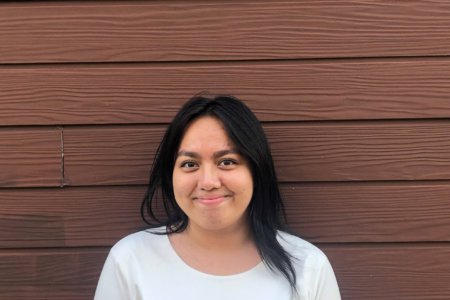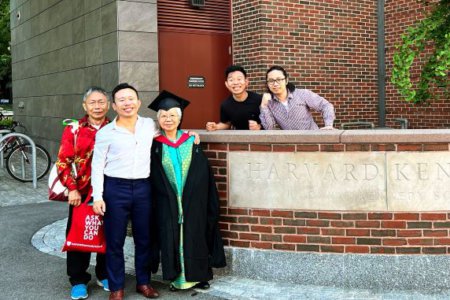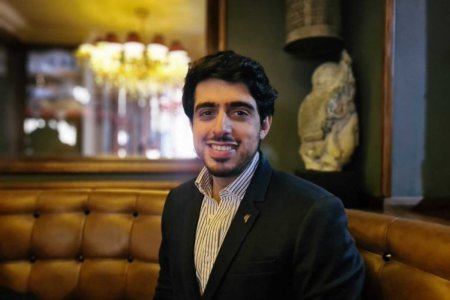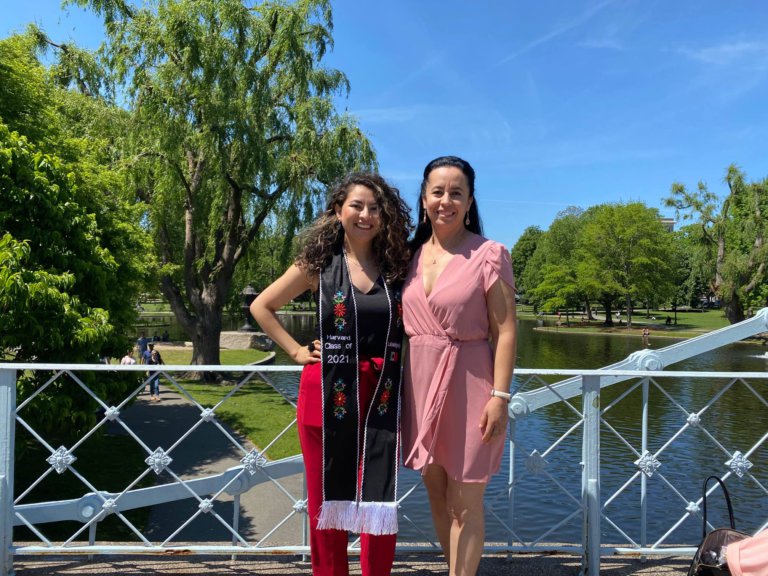
After years of blood, sweat and tears — including a perilous crossing of the US-Mexico border — Nataly Morales Villa’s parents are the picture of immigrant success. At only 26, their daughter not only holds two bachelor’s degrees, but also recently graduated from Harvard University with a Master’s in Education.
She is the first in her family (she has 41 cousins!) to graduate from high school and university — a feat she credits to her mother, her biggest source of inspiration.
“She worked very hard at a chicken processing plant — she woke up at 4 am every day, working eight to 10-hour shifts of physical labour. Despite her being busy, she still comes home to cook meals for me. That’s why when I graduated, I dedicated it all to her,” Villa explains.
We caught up with Villa to learn more about her background, her experience studying at Harvard University and her plans for the future.

Villa recently graduated from Harvard University with a Master’s in Education. Source: Nataly Morales Villa
Hi Nataly. Can you tell us a little bit about yourself?
I was born in Mexico in a village named El Mezquital Durango. I was five years old when I immigrated to the US. I grew up in Gainesville, Georgia, also known as the poultry capital of the world because of the poultry plants in the area, which have attracted dozens of Latino immigrants.
Currently, 42% of the population in Gainesville is Latin X. Thirty years ago, it was mainly white, so that’s how much the demographics of the community where I grew up have changed.
I studied for my bachelor’s at the University of North Georgia, where I obtained a degree in political science and a certificate in Spanish translation. I’m fluent in both Spanish and English, and I understand some Portuguese.
Congratulations on your recent graduation from Harvard Univerisity! Tell us about your decision to pursue a Master’s in Education.
Thank you. It has been, to say the least, a tremendous journey. I am a firm believer that education is liberation. Back in Mexico, my parents didn’t have the opportunity to pursue an education beyond the equivalent of middle school. My grandparents, due to the poverty they grew up in, didn’t have the opportunity to pursue it beyond elementary school.
The little village where I grew up follows traditional gender roles, so women weren’t encouraged to pursue a college education. They were, instead, encouraged to pursue marriage and having children.
In the US, I became the first person in my family to graduate high school, graduate with a bachelor’s degree and ultimately with a master’s degree from Harvard in Education Administration, which still sounds surreal.
Could you walk us through your journey of applying to Harvard University? How did you feel when you found out you were accepted into one of the world’s top universities?
My journey was unique in the sense that I applied during the pandemic. In March, COVID-19 happened. In May, I saw a message that the Harvard Graduate School of Education decided to reopen their application cycle online because of COVID-19.
So in one month, I gathered and submitted all my information and essay references. And in June, I decided, “You know what, let me go for it; let’s see what happens; let me cross my fingers.”
On July 31, 2020, my mum and I were on a plane to Mexico to take care of my grandparents — that’s when I got an email saying an admissions decision had been made. I was like, “Oh my gosh, should I open it now? The plane is about to fly off. Should I wait until I’m in Mexico with my parents? Would I get accepted? What if I don’t? You know, in my head, things were like crazy.”
I decided to open the email right before the plane launched. It said, “Congratulations. You’re accepted to the Harvard Graduate School of Education.” And I bawled my eyes out. I cried and hugged my mum more than anything, reflecting on her sacrifices as an immigrant mother — having to risk her life crossing the US-Mexico border illegally so that she could offer me better opportunities. It was such an emotional feeling.
What did you like about the university?
I really enjoyed how diverse Harvard is. It was the first time that I had a Latino professor and a black professor.
During my bachelor’s programme, I attended a predominantly white institution. Growing up, from kindergarten to high school, I never had a Latino counsellor or teacher. My bachelor’s degree was the first time I met a Latino counsellor and mentor.
So I enjoyed seeing so much representation the first time I was on campus at Harvard. I enjoyed hearing students speak so many languages and not just Spanish.
Back home, unfortunately, it’s still a very conservative community. People don’t always look fondly at you for speaking Spanish, so I felt very welcome to see students of international backgrounds speaking other languages.

Villa with her mother and grandparents. Source: Nataly Morales Villa
What was your most memorable class, and why? How did the lecturers support you in your studies?
I, unfortunately, had to start online because of the pandemic. My favourite class was a negotiation course that I took.
For a long time, I had already been interested in knowing how to become a better negotiator in terms of salary or professionally. In the US, Latinas make about US$0.57 per every dollar that a white male makes. They are already underpaid, especially immigrant women who don’t have formal education.
With the class, I’m more confident in my negotiation skills — it exposed me to how to negotiate salary, personal matters, and, you know, family. In Latinx culture, we have very close, tight-knit family circles, which sometimes have a lot of drama and emotions.
How has the education at Harvard made you who you are today?
Something that I didn’t see myself becoming was an entrepreneur. I took an entrepreneurship class and education marketplace, and that’s how my little entrepreneurship bugs started.
I am launching a website to be a motivational speaker and offer advice and consultation services for students. I wish to sell graduation stoles that artisans in my hometown would embroider and personalise. For my graduation, my stole was personalised with a Mexican flag, my name, social media handle, class and graduation year. This is a dream come true to have been able to represent my culture and my country with a personalised style.
Tell us more about your decision to pursue your chosen programmes at the University of North Georgia and the Universidad Andina del Cusco
I decided to pursue political science and Spanish because I initially wanted to become an immigration lawyer, given my family’s background.
I’m very, very grateful that I’ll be a US citizen. My mom now has status as well. I was always inspired to give back to my community by being an immigration lawyer.
I chose to obtain the certificate in Spanish translation because my parents had always instilled in me the importance of not forgetting my language and culture. I also wanted to perfect my writing in Spanish. So to me, those were important. I am now a certified Spanish translator.
But when I graduated, I realised I was not looking forward to law school, having to study for the LSAT, and overall felt at that time that law school wasn’t for me.
Instead, I was always super involved at my undergraduate institution. I absolutely loved working with students, and to me, having access to a college education is the way to end the generational cycle of poverty, misogyny and alcoholism (it happened to my family).
Can you tell us about your experience as a US immigrant?
One of the biggest challenges, unfortunately, was having to see my father succumb to alcoholism. Because of this, my mother became a single mother — she didn’t know English and had very limited education in Mexico. She grew up in a very large traditional Mexican family. She was one of eleven siblings.
After discovering during the pandemic that my father was diagnosed with a terminal illness because of his alcoholism, I reconnected with him. I’m happy that we reconnected and respected his last wishes.
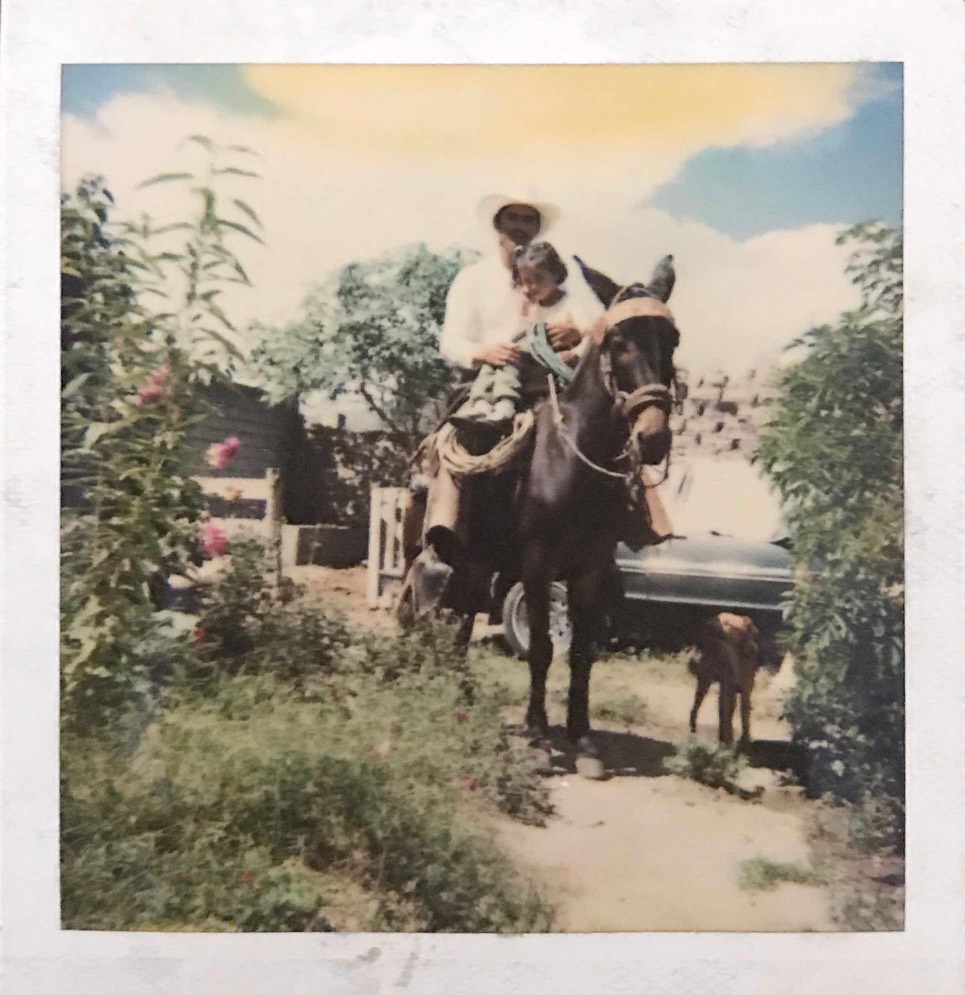
Villa, when she was a kid, with her late father in Mexico. Source: Nataly Morales Villa
You have also taken on various jobs and internships while studying. Tell us about your most memorable experience. What are some of the challenges you faced?
I landed an internship at the Congressional Hispanic Caucus Institute. It was amazing because they are an organisation specifically designed to increase the representation of Latino students in Congress, and they paid for everything.
Being there, I went through imposter syndrome. As I walked the halls of Congress, I did not see people who looked like me or had my background. “What is a girl born in a village in Mexico doing here?” I thought to myself. I had all these ideas and doubts going through my head.
But now I know that I did belong there — my lived experiences were just as worthy as those of different backgrounds. I know I provided such a valuable perspective because of my background as a Latina immigrant.
What are your plans now?
I’ve been going through different job interviews and am now waiting for results, so fingers crossed.
My dream job would be to work as a university recruiter specifically for a big tech company like Google, TikTok, Facebook or Instagram. University recruiters travel to various universities at conferences or in the country to identify talented students to onboard them for internships, fellowships or as first-year professionals.
I would absolutely love to be a recruiter — I would want to identify potential employees, especially first-generation college students, students who are underrepresented in the private and tech sector and students who aren’t even aware these jobs exist.
Do you have advice you’d like to share to other students, especially those who are of colour or come from underrepresented communities?
I always say: find a mentor. There will always be someone who looks like you. That’s why we need more students of colour pursuing education and becoming first-generation professionals. When you achieve that, give back by becoming that mentor who was there for you.
Don’t be afraid to knock on the door — if one door closes, knock on another, and another, and another because one will eventually open.
Don’t be afraid to reach out on LinkedIn — there’s always someone on social media who may not have the same background or look like you but would appreciate you sending a simple message. Connect with them — introduce yourself and tell them that you would love to learn about their career trajectory. Don’t be afraid to network, ask questions and ask for help.








